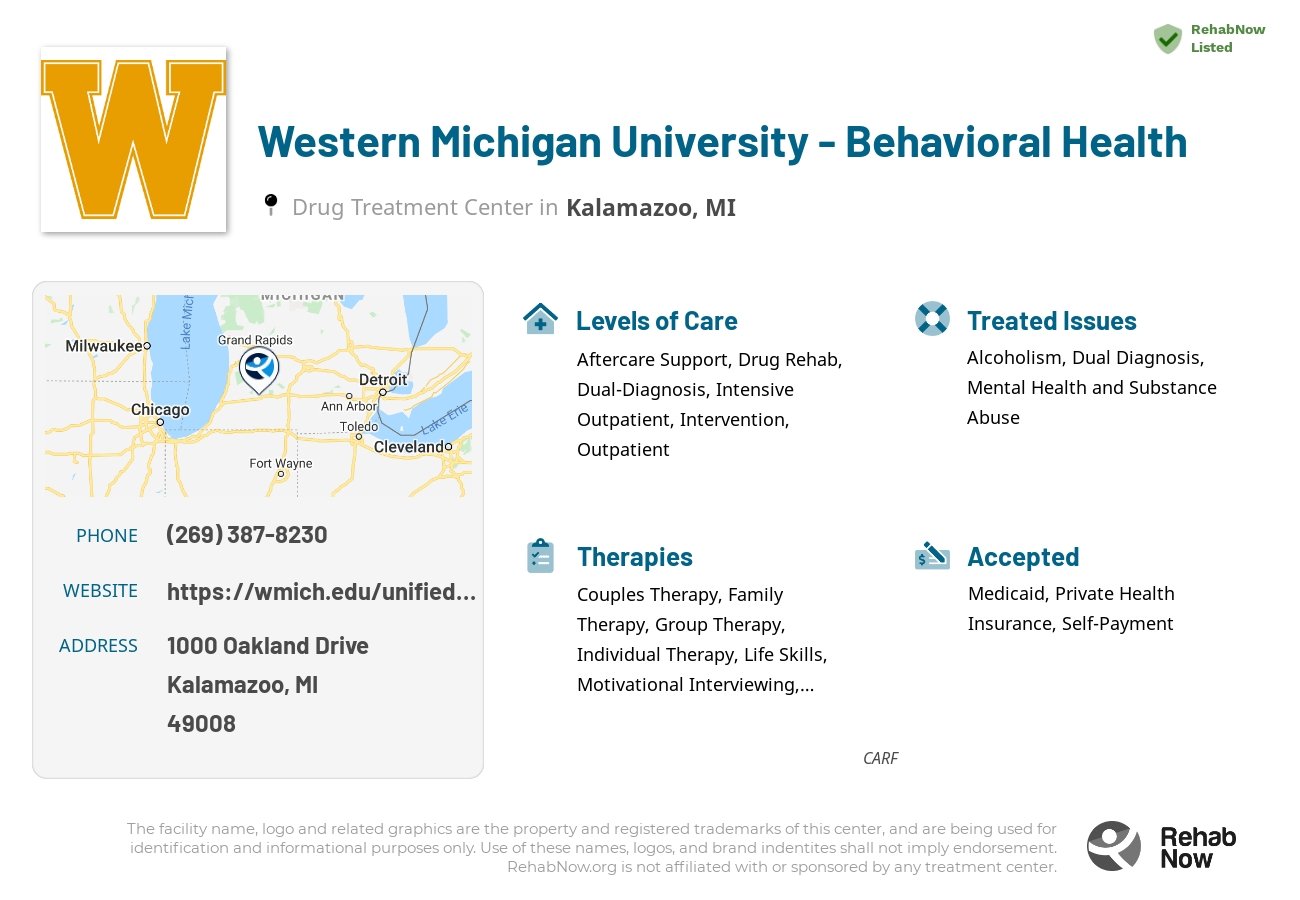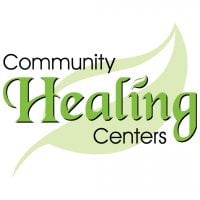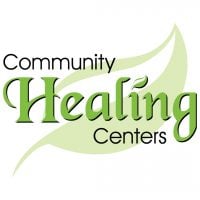Western Michigan University - Behavioral Health
Drug Rehab Center in Kalamazoo, Michigan
Western Michigan University - Behavioral Health in Kalamazoo, Michigan offers individualized mental health services and specialized programs for addiction and substance abuse, focusing on evidence-based care and reducing social stigma while providing a safe, supportive environment for recovery.
About Western Michigan University - Behavioral Health in Michigan
Western Michigan University - Behavioral Health located in Kalamazoo, Michigan, offers a wide variety of mental health services, along with specialized programs for those struggling with addiction and substance abuse. The facility provides an individualized approach to care, offering professional counseling and treatment for every personalized need. Western Michigan University - Behavioral Health provides a safe and supportive environment for individuals to receive the necessary treatment, and strives to reduce the social stigma of addiction and help individuals regain a sense of control and stability in their lives.
At Western Michigan University - Behavioral Health, clients have access to a range of evidence-based care for substance abuse and addiction, such as medication-assisted treatment, specialized addiction therapies, and group and individual counseling. Treatment is tailored to the individual's needs, and clients can work closely with trained counselors as they work toward long-term recovery. In addition to substance abuse services, the facility provides access to psychiatric care, life skills coaching, and care coordination services.
Western Michigan University - Behavioral Health is accredited by the Joint Commission, and is also licensed by the State of Michigan. The facility has also earned multiple recognitions, such as the Gold Seal of Approval from the Joint Commission, and has been named a Certified Opioid Treatment Service Program by the State of Michigan. The staff at Western Michigan University - Behavioral Health are dedicated to providing quality, comprehensive care to individuals struggling with addiction, and are passionate about helping individuals regain control of their lives.
Genders
Ages
Modality
Additional
Accreditations

CARF
The Commission on Accreditation of Rehabilitation Facilities (CARF) is a non-profit organization that specifically accredits rehab organizations. Founded in 1966, CARF's, mission is to help service providers like rehab facilities maintain high standards of care.
Conditions and Issues Treated
Dual Diagnosis is a specific relationship between two or more disorders that have the same symptoms and can sometimes be treated together. This is used in the treatment planning process when dealing with drug addicts. Dual diagnosis can be viewed as a chronic medical condition that has comorbid psychiatric disorders.
Although addiction and a mental illness may have separate symptoms that are not easy to detect, they often go hand in hand. Many times, drug abuse is a direct result of the mental illness. In other words, treating the addiction will not resolve all of your issues. Unless you also treat the underlying mental illness, you will not be successful in achieving sobriety.
Levels of Care Offered
This center offers a variety of custom treatment tailored to individual recovery. Currently available are Aftercare Support, Drug Rehab, Dual-Diagnosis, Intensive Outpatient, Intervention, Outpatient, with additional therapies available as listed below.
An intensive outpatient program is usually the first phase of addiction treatment. It provides relief for those who are addicted, but are not ready to commit to an inpatient setting. Typically, the patient lives at home and is able to work or go to school. IOPs consist of a daily 3 to 5-hour program, and there is a required number of hours per week. Most patients go to IOP between 20 and 40 hours per week. The patient attends group counseling and individual therapy throughout the duration of treatment. They also meet daily with their therapist to discuss how it’s going and where they are in the recovery process.
The goal here is to teach patients healthy coping skills, such as stress management and identifying thoughts and behaviors that lead to relapse. The implementation of these skills will be useful as the individual transitions into the next phases of treatment.
An outpatient treatment program is set up to help with alcohol or drug addiction, or a co-occurring disorder. The patient must attend the Michigan facility for their therapy and other programs but are able to return home each night. The frequency of mandatory attendance decreases after much of Western Michigan University - Behavioral Health‘s program is complete.
Intervention services can be beneficial for people who have not been able to overcome drug and alcohol addiction on their own. It is recommended for individuals whose addiction has led to dangerous or life-threatening circumstances.
Intervention services are beneficial for:
- People who have relapsed after completing other forms of addiction treatment.
- People with drug addictions that have led to dangerous health conditions, such as HIV.
- People who are at risk of losing their family, home, or job due to addiction.
- People who are having difficulty overcoming drug and alcohol addiction on their own.
- An intervention can be conducted by professionals, or by loved ones of an addict. If the person being intervened on agrees to enter addiction treatment after the intervention, the next step would be to choose a treatment program.
If they do not agree to enter addiction treatment after the intervention, loved ones may choose to go back to the drawing board and try another form of treatment. They may also choose to not receive any further treatment, but there are usually other factors in play that may make it difficult for people to stop using drugs or alcohol.
Aftercare is a term that’s used to refer to any sort of continuing care offered for a drug addict who has voluntarily entered a rehabilitation program. This type of care can be provided in several settings, including outpatient therapy sessions after the addict has completed an inpatient program. There are also 12-step support groups, such as Alcoholics Anonymous, which can provide additional help for addicts trying to stay sober.
Therapies & Programs
Individual Therapy is a critical component of addiction recovery. Therapists work with patients to identify the root of their addiction and figure out how to better handle the issues that led to them using drugs. Individual Therapy is the one-on-one session where people meet with their therapist. Individual therapy provides a safe space for people to open up and discuss personal and sensitive topics which they may not feel comfortable discussing in a group setting.
Couples therapy at Western Michigan University - Behavioral Health focuses on addiction treatment for the addict and their spouse. The addict’s family, not just the addict, can benefit from this form of therapy. Couples therapy addresses communication problems, trust issues, lack of intimacy, and abuse in intimate relationships. Couples therapy can help rebuild trust between partners, which increases the chances for successful treatment and sustained recovery.
Intimate relationships can be damaged during addiction, and professional help may be necessary to rebuild the often destroyed trust and love. Couples therapy at Western Michigan University - Behavioral Health helps couples improve communication and rebuild trust. Either or both partners will be helped by this treatment administered by professionals. This treatment can also help one or both partners if addiction is the problem.
Family therapy will also help families realize that the addiction is not their fault. For many years, people blamed themselves for an addict’s behavior and felt that they had done something wrong. This is not the case. Addiction is a disease, and it can strike anyone, even if their life seems fine from the outside. It can bring a lot of shame to a family when they have an addict in their midst, but if everyone is open and honest with each other, then they can help everyone stay in recovery.
Group Therapy is utilized by drug treatment centers like Western Michigan University - Behavioral Health to provide the recovering drug addict with a platform to talk about their feelings and experiences. It also provides for an opportunity to learn from other addicts who have successfully overcome their addiction.
Group Therapy is employed in lectures, seminars, or discussion groups (the latter two are typically conducted as “therapy groups”). It is recommended that all group members be recovering addicts for this type of therapy to work (though it does not exclude others with lived experience).
Trauma therapy is a clinical process that helps individuals deal with mental stress often caused by traumatic events. It is generally done for children, teenage victims of sexual assault, and war veterans. The therapist helps the person identify, understand and work through the problem. This is done with the help of talking about it in group or one-on-one counseling sessions. Therapists use relaxation, role-playing, art, and music to help the person open up about what is bothering them.
Cognitive behavioral therapy is also a popular service for individuals living with addiction. This type of supportive treatment uses both one-on-one counseling and group sessions to teach addicts how to identify thoughts, behaviors and emotions that might increase their risk of relapse.
These professionals can help addicts develop coping skills for managing stress, improving self-esteem and overcoming triggers. They might also use behavioral therapy to help addicts learn how to avoid cravings and warning signs that could lead them back into addiction.
Therapy can be used as a step-down from inpatient treatment or as the primary method of overcoming an addiction. No matter which option is best for the addict, they will teach important emotional coping techniques, which can make it easier for addicts to get through the tough days.
Training in improved life skills helps those recovering from addiction feel more capable of self-care. Western Michigan University - Behavioral Health are daily skills that give the person the tools they need to survive.
The therapy covers practical activities like cooking, job hunting, social interaction, and money management, helping to fill in the knowledge gaps caused by addiction.
These life skills help the person self-manage their recovery and stay on track. It also reduces relapse risk as they gain confidence in their day-to-day abilities.
Payment Options Accepted
For specific insurance or payment methods please contact us.
Is your insurance accepted?
Ask an expert, call (888) 674-0062
Western Michigan University Associated Centers
Discover treatment facilities under the same provider.
Learn More About Western Michigan University Centers
Additional Details
Specifics, location, and helpful extra information.
Kalamazoo, Michigan 49008 Phone Number(269) 387-8230 Meta DetailsUpdated November 25, 2023
Staff Verified
Western Michigan University - Behavioral Health Patient Reviews
There are no reviews yet. Be the first one to write one.
Kalamazoo, Michigan Addiction Information
Michigan has the second-highest rate of drug and alcohol abuse in the nation. Heroin is linked to more than 50% of the state's hepatitis C cases. Marijuana is the drug most often associated with crimes in Michigan, followed by methamphetamines. Opioids alone are responsible for almost 20% of all drug overdose deaths in Michigan.
Kalamazoo, Michigan has a serious drug addiction and abuse problem. In 2016, there were 120 drug overdose deaths in Kalamazoo County - a rate of 18.6 per 100,000 people. The most commonly abused drugs are marijuana, heroin, and prescription opioids. Families are affected, with many children being left without parents due to addiction. In Kalamazoo, MI, there are a variety of treatment facilities that offer different types of care.
Treatment in Nearby Cities
- Southgate, MI (123.3 mi.)
- Oak Park, MI (124.1 mi.)
- Portage, MI (5.8 mi.)
- South Haven, MI (35.4 mi.)
- New Buffalo, MI (67.8 mi.)
Centers near Western Michigan University - Behavioral Health
The facility name, logo and brand are the property and registered trademarks of Western Michigan University - Behavioral Health, and are being used for identification and informational purposes only. Use of these names, logos and brands shall not imply endorsement. RehabNow.org is not affiliated with or sponsored by Western Michigan University - Behavioral Health.









